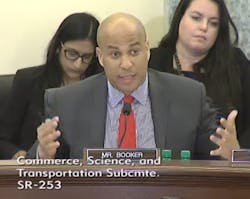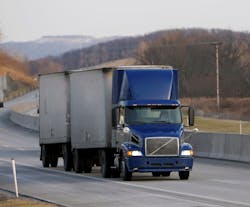Senate Democrats continue to question safety of 33-foot trailers
Longer trucks continue to get attention in Congress as Republicans and business interests push for improved supply chain efficiency while Democrats, spurred by highway safety advocates, argue that profit shouldn’t come before people’s lives.
The most recent exchange on Capitol Hill came Tuesday in a Senate Commerce subcommittee hearing focused on coming transportation technologies and the role of the federal government. And though much of the discussion focused on the latest developments for improving freight flow on the roads, on the rails and at ports, a couple of senators made a special effort to voice concerns about pending legislation to allow 33-foot dual trailers on the federal highway system.
“How I would love to talk to more about drones … and the transformative possibilities, but sadly I’m coming back down to earth to talk about trucks,” said Sen. Cory Booker (D.-NJ), ranking member on the transportation subcommittee, speaking to panel witness Paul Misener, Amazon vice president of global public policy.
Booker questioned the online shopping giant’s support of “10 feet longer trucks,” and cited a Dept. of Transportation study that shows the twin-33s take about “a car length and a half” more distance to stop than the current federally permitted configuration, twin-28s. Additionally, “the larger trucks are where the greater destruction occurs.”Misener replied that Amazon has been persuaded by its carriers that longer trailers would provide both business and safety benefits.
“Any policy choice is a balancing of factors, and I’m not sure there’s any particular magic to 33 feet over 32 or 34, or 28,” Misener said. “What we’re trying to do is find a solution to improve efficiencies. But if at the same time we can drive down the number of trucks on the road, that is a safety improvement.”
The increase in trailer length that Amazon supports does not increase the vehicle weight, he emphasized—and it’s the weight that contributes to the kinetic energy in a crash, not the length. Likewise, the length does not adversely impact roads and bridges—“in fact, it can help” because the weight is less concentrated.
Earlier this week, the Truck Safety Coalition called on its supporters to contact Amzon CEO Jeff Bezos "and urge Amazon to reconsider their anti-safety position."
"Public opinion is clear and convincing—the public does not want bigger trucks on the road," according to one of the coalition's talking points. "The opposition is strong and there is no distinction between males and females, age of respondent, political affiliation, income level or place of residence: 76% of the respondents in a recent public opinion survey opposed longer and heavier trucks."
Similarly, Sen. Bill Nelson of Florida, the ranking Democrat on the Commerce committee, noted that 4,000 people are killed in truck accidents each year, and he reported meeting recently with “a grieving mom” whose daughter and son-in-law had been killed on their honeymoon when a tractor-trailer crashed into the passenger car stopped for traffic on I-95.
Nelson explained the driver had been asleep at the wheel as a result of his demanding intrastate schedule—to which federal hours of service limits didn’t apply. The oblique connection, as he eventually got around to it, is that Florida also allows intrastate twin-33s—“which is an issue that will be in front of this committee with regard to truck safety.”
The hearing otherwise revolved around developments in various technologies and how the federal government might be hindering advancement with regulations rather than enabling with forward-looking legislation.
For trucking, Volvo Group Senior Vice President for Public Affairs Susan Alt explained the work being done on vehicle-to-vehicle (V2V) and vehicle-to-infrastructure (V2I) communication, and urged Congress to maintain protection for the safety-critical radio frequency bandwith that supports it.
Alt also called on the federal government to develop uniform standards for autonomous vehicle operation to allow such systems to be implemented on an interstate basis.
About the Author
Kevin Jones 1
Editor
Kevin has served as editor-in-chief of Trailer/Body Builders magazine since 2017—just the third editor in the magazine’s 60 years. He is also editorial director for Endeavor Business Media’s Commercial Vehicle group, which includes FleetOwner, Bulk Transporter, Refrigerated Transporter, American Trucker, and Fleet Maintenance magazines and websites.

